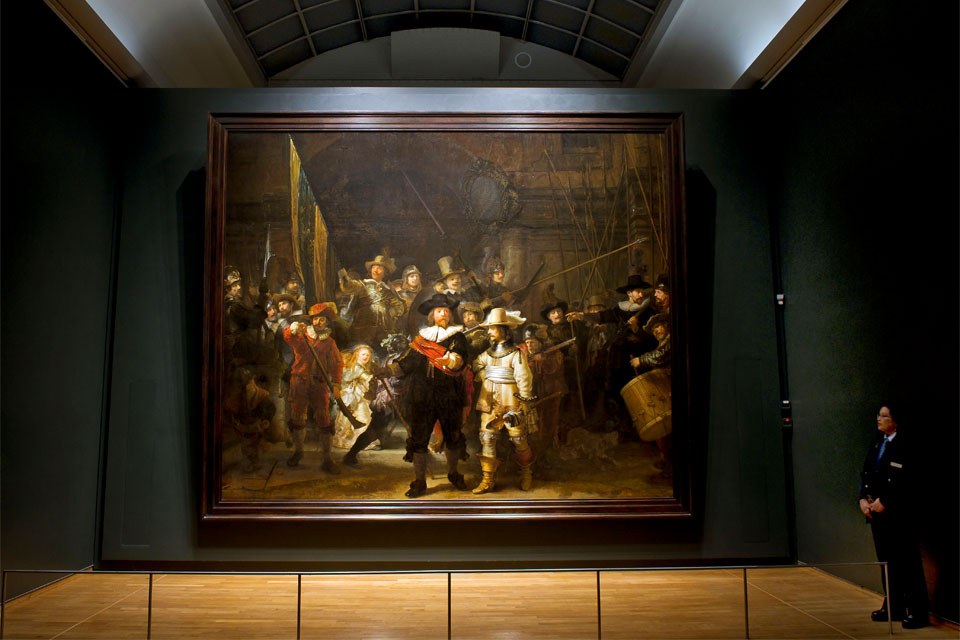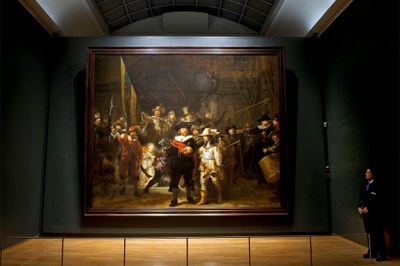Philips Sheds New Light on Night Watch at the Rijksmuseum
Royal Philips announced today that starting on October 26, one of the world’s most renowned paintings will be bathed in a new light. Philips, Founder of the renovated Amsterdam Rijksmuseum, presents Rembrandt van Rijn’s Night Watch in innovative LED light, bringing out the best of the painting’s color palette while offering increased sustainability and energy efficiency. Through the project, the two Masters of Light are reinforcing their intensive collaboration aimed at joint innovation in the area of LED lighting, setting the new standard for museum lighting.
The 5-year extension of the partnership was sealed this afternoon in the Rijksmuseum by Frans van Houten, CEO of Philips, and Wim Pijbes, General Director of the Rijksmuseum. The Night Watch was relit for the occasion by Philips, combining innovative LED lighting with an advanced light control system. The new lighting will help reduce the Rijksmuseum’s energy consumption.
LED technology has been developed to the point that the Rijksmuseum felt it needed to adopt this innovation. The new lamps ensure optimal color rendering, lending an even greater expressive quality to the objects. In terms of light quality, the LED solution easily outstrips the halogen spot, praised for its warm color and broad spectrum.
A key element in the partnership between Philips and the Rijksmuseum lies in the intensive exchange of knowledge between the two parties with regard to the development of LED solutions for lighting art and architecture.
As Founder, Philips has been involved since 2001 in the biggest restoration and renovation project in the 126-year history of the Rijksmuseum. During the renovation, the highlights of the Golden Age have been on display in the Philips Wing, attracting an average of 950,000 visitors a year since it opened in 2003. Starting in 2014, major exhibitions will be held in the wing, which will be permanently named the Philips Wing. From 2013 onward, the Rijksmuseum expects to welcome about 2 million visitors each year.
Frans van Houten, CEO of Philips said: “I’m proud that we had the privilege to work closely with the Rijksmuseum in creating a state-of-the-art lighting solution for an age-old and world-famous masterpiece. I look forward to continuing our partnership with the Rijksmuseum, which shares a history and global reputation equal to Philips and – like us – gives high priority to innovation.”
Wim Pijbes, General Director of the Rijksmuseum, said: “For me as director of the Netherlands’ leading museum, Philips is the ideal partner to shed new light on our Golden Age.”
About Royal Philips Electronics:
Royal Philips Electronics of the Netherlands (NYSE: PHG, AEX: PHI) is a diversified health and well-being company, focused on improving people’s lives through timely innovations. As a world leader in healthcare, lifestyle and lighting, Philips integrates technologies and design into people-centric solutions, based on fundamental customer insights and the brand promise of “sense and simplicity.” Headquartered in the Netherlands, Philips employs over 120,000 employees with sales and services in more than 100 countries worldwide. With sales of EUR 22.3 billion in 2010, the company is a market leader in cardiac care, acute care and home healthcare, energy efficient lighting solutions and new lighting applications, as well as lifestyle products for personal well-being and pleasure with strong leadership positions in male shaving and grooming, portable entertainment and oral healthcare. News from Philips is located at www.philips.com/newscenter.
About the Rijksmuseum:
Founded in 1798 as the Nationaal Museum, the Rijksmuseum moved into the current building in Amsterdam in 1885. After the biggest reconstruction and restoration in its history, the fully renovated Rijksmuseum will reopen its doors to the public in 2013. The leading museum of the Netherlands will then exhibit the art and history of the Netherlands from the period between 1200 to 2000 to an international audience, highlighting masterpieces from the Golden Age like Vermeer’s Milkmaid and Rembrandt’s Night Watch.


